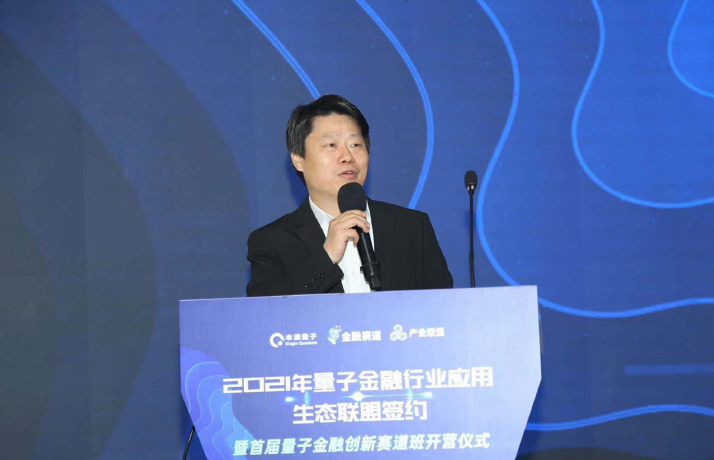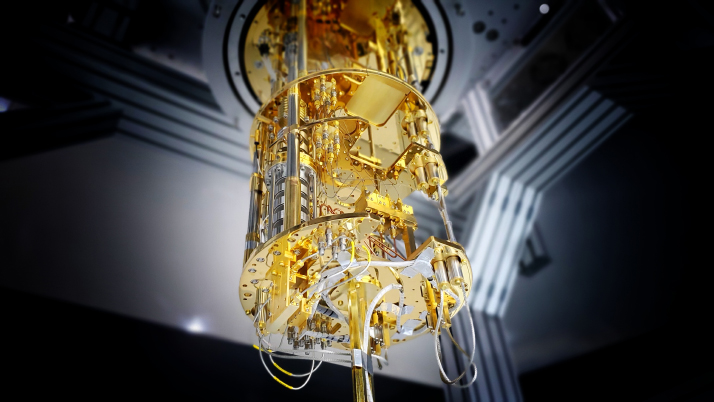| China |
| NPC deputy contributes to quantum computing research | |
|
|
 Guo Guoping, cofounder of Origin Quantum Computing Technology Co. Ltd. and a deputy to the 14th National People's Congress, speaks at a conference in 2021 (COURTESY PHOTO)
It was the year 2005. Six researchers were in a classroom of the University of Science and Technology of China (USTC) in Anhui Province, busy working toward their dreams as pioneers of quantum computing. As there was only one computer available to them, they had to take turns sitting at the terminal to complete their work. Back then, the team members may never have imagined how far their research would take them. One of the researchers, Guo Guoping, a professor of quantum transport in his 40s, has been part of China's quantum industry since its inception. In addition to his role at USTC, Guo is deputy director of the Key Laboratory of Quantum Information at the Chinese Academy of Sciences. Earlier this year, he was elected as a deputy to the 14th National People's Congress (NPC) for the first time. "Over recent decades, the focus of quantum computing in China has shifted from only theoretical research to both theory and technical application," Guo told Beijing Review. As an NPC deputy this year, Guo suggested developing platforms for quantum computing training and improving the systems for evaluating workers in the technology industries. Quantum industries mainly focus on computing, communication and measurement. A quantum computer makes use of quantum mechanics to achieve more efficient computation than classical computers. D-Wave, a Canada-based quantum computing company, sold its first quantum computer in 2011. U.S. tech giant IBM then delivered one in 2019. In 2017, the team of six from USTC established Origin Quantum Computing Technology Co. Ltd. in Hefei City, capital of Anhui, the first quantum computing company in China. The company delivered its first quantum computer to a user in 2021, making China the world's third country with the ability to produce them. A fervent pioneer In 1996, Guo was admitted to the foreign language institute of USTC, but then transferred to the physics department to pursue his interest in the subject of quantum computing. While he focused on researching quantum communication during his postgraduate and doctoral studies, he noticed that quantum computing in China lagged behind that of many other countries. Together with his supervisor and peers, Guo began research on quantum chips for semiconductors, a seldom trodden road at that time. Since 2009, he has been working as a professor at USTC, and continues to dedicate himself to research. The research team began from scratch with financial support from USTC and the tech authorities. "We saved all of our funds for buying research materials. After the single chair in our lab broke down, we started standing at the computer to conduct research instead of buying a new one," Guo recalled. The concepts of quantum computing, a cutting-edge field, were unknown and challenging for many firms in China in the past decade. After finding themselves unable to secure corporate partnerships, Guo and other team members established Origin Quantum in 2017. "As quantum computing companies did not exist in China at the time, quantum computing graduates found it hard to find employment. Origin Quantum aimed to make full use of their talents and drive the sector in China toward catching up with the global standard," he said. Guo sold one of his houses in order to alleviate a funding shortage during the company's initial period. However, the company has now matured to a point where funding is no longer a problem. In July last year, a new round of its equity financing totaled nearly 1 billion yuan ($144 million). To improve the quality of its quantum computing chips, which serve as the core of quantum computers, the company has been developing production equipment independently. One experiment can take the researchers up to more than 12 hours. "Over the past decade, I have spent many holidays in the lab," Guo said. Origin Quantum has delivered notable results since its launch. In 2018, the company developed China's first quantum computer control system with patented intellectual property rights. The system is aimed at improving the performance of quantum computing chips. The company developed China's first superconducting quantum computer Wuyuan in 2020, which has been providing quantum computing services to global users through a cloud platform. In January this year, it introduced China's first MLLAS-100 laser annealer to improve the precision of quantum chips, which are developed for its new quantum computer Wukong, which is under production. Origin Quantum has also been promoting the application of its technologies. In 2022, it signed a deal with China Mobile, one of China's largest telecom operators, to address computing problems in the application of 5G and 6G technologies through quantum computing. Zhang Hui, Origin Quantum's General Manager, is one of Guo's former students. He first worked in the financial industry after completing his Ph.D. in quantum physics, but then gave up his well-paid job and joined Origin Quantum soon after its establishment. "More than 75 percent of our more than 200 employees work on research and development (R&D). Most of us are aged under 27," Zhang told Beijing Review. On October 18 last year, Origin Quantum registered its 234th quantum computing patent, ranking first in China and sixth among quantum computing firms internationally on the Global Quantum Computing Technology Patent Filings Ranking List released by IncoPat Global Patent Database and media outlet IPR Daily.  A prototype quantum computer of Origin Quantum (COURTESY PHOTO)
A rising star Quantum computing is expected to see wide application. According to Zhang, data produced by the artificial intelligence (AI) industry doubles approximately every quarter, but it often takes more than one year to make each new improvement to the computing capacity of regular computers. The more efficient computing of quantum computers is highly applicable in the AI and finance industries given the huge volumes of data they produce. In 2018, the company initiated China's first quantum computing industrial league, in which financial enterprises and institutions account for nearly 30 percent. Moreover, it often takes two to three decades to develop a new drug, while that time could be shortened to several weeks with simulated drug research and development facilitated by quantum computing. The quantum computers can also facilitate development of new materials and improve the precision of weather forecasting. Quantum computers are not replacing regular computers but are instead used in conjunction with them to improve their computing efficiency. In the next three to five years, quantum computers will deliver more tangible benefits in many industries, Guo said. Guo is confident his research will yield more breakthroughs. "While quantum chips need to work at minus 270 degrees Celsius, motherboards work at room temperature. If technologies connecting chips and motherboards become full-fledged, one application is that lunar rovers will no longer require regular rest periods, so longer operation will become possible," he said. Today, over 100 quantum computing companies across the globe are spending heavily on R&D, Zhang said U.S.-based consulting firm McKinsey & Co projected in 2022 that quantum computing will generate nearly $700 billion of total value by 2035 in industries including pharmaceuticals, chemicals, automobiles and finance. China has been promoting the development of quantum-related industries in recent years. In 2016, it launched the world's first quantum science satellite, Mozi, or Micius, which was named after an ancient Chinese philosopher. It achieved cross-continental quantum-secured communication between China and Austria. As the 14th Five-Year Plan (2021-25) outlines, China's authorities will further boost quantum communication and computing. According to Guo, China has become a leader in the theoretical research of quantum computing in some fields. However, many countries started earlier than China on the application of the technologies and the gap is widening in fields including biopharmacy, finance and chemistry. "We aim to expand the application of quantum computers in China. Today, many users are applying systems of quantum computing produced by the global giants. Chinese firms in the sector should seize opportunities to improve their market shares," Guo said. (Print Edition Title: A Super Brain) Copyedited by G.P. Wilson Comments to lixiaoyang@cicgamericas.com |
|
||||||||||||||||||||||||||||||
|
